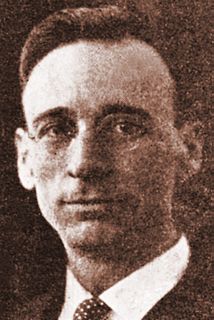A Quote by Hermann Hesse
You learned people and artists have, no doubt, all sorts of superior things in your heads; but you're human beings like the rest of us, and we, too, have our dreams and fancies.
Related Quotes
People expect artists to be too normal, I think. I've been around enough of them now to see that they're very extraordinary human beings who behave differently than ordinary human beings. If they weren't as sensitive as they are, they wouldn't be great artists. They are not the same as us. People should just learn to accept that.
In times of widespread chaos and confusion, it has been the duty of more advanced human beings--artists, scientists, clowns and philosophers--to create order. In times such as ours, however, when there is too much order, too much management, too much programming and control, it becomes the duty of superior men and women to fling their favorite monkey wrenches into the machinery. To relive the repression of the human spirit, they must sow doubt and disruption.
I feel like human beings can't help but destroy, but if our numbers are small we don't destroy as much as we do when our numbers are this huge and out of control. I wonder, what's the carrying capacity for human beings? When do we get to the point when we can't take it anymore, when it becomes too unpleasant to us just to be here because there's too many of us and there's no solitude anymore.
There is a certain indolence in us, a wish not to be disturbed, which tempts us to think that when things are quiet, all is well. Subconsciously, we tend to give the preference to 'social peace,' though it be only apparent, because our lives and possessions seem then secure. Actually, human beings acquiesce too easily in evil conditions; they rebel far too little and too seldom. There is nothing noble about acquiescence in a cramped life or mere submission to superior force.
Literature gives us models of living human beings who may not agree with us and even be our enemies. D. H. Lawrence said that the purpose of literature was to expand our sympathies. To be a human being is to be in a state of tension between your appetites and your dreams, and the social realities around you and your obligations to your fellow man. And this conflict cannot be easily reconciled. The tension is always there as a kind of a pain in the human condition.
Artists use frauds to make human beings seem more wonderful than they really are. Dancers show us human beings who move much more gracefully than human beings really move. Films and books and plays show us people talking much more entertainingly than people really talk, make paltry human enterprises seem important. Singers and musicians show us human beings making sounds far more lovely than human beings really make. Architects give us temples in which something marvelous is obviously going on. Actually, practically nothing is going on.
Peace does not rest in the charters and covenants alone. It lies in the hearts and minds of all people. So let us not rest all our hopes on parchment and on paper, let us strive to build peace, a desire for peace, a willingness to work for peace in the hearts and minds of all of our people. I believe that we can. I believe the problems of human destiny are not beyond the reach of human beings.
A person is a person through other persons. None of us comes into the world fully formed. We would not know how to think, or walk, or speak, or behave as human beings unless we learned it from other human beings. We need other human beings in order to be human. I am because other people are. A person is entitled to a stable community life, and the first of these communities is the family.
Writers. For some reason, a lot of you reject what you hear and see in your heads. If you go too long ignoring it, it builds up and then you do all sorts of weird things. Mumble to yourself. Nightmares. Day-dreams. Total anarchy and chaos. Before you know it, the writer is either sitting in corner feverishly humming to his- or herself or on Prozac. You’re not on Prozac, are you? (Esther)
History leaves no doubt that among of the most regrettable crimes committed by human beings have been committed by those human beings who thought of themselves as civilized. What, we must ask, does our civilization possess that is worth defending? One thing worth defending, I suggest, is the imperative to imagine the lives of beings who are not ourselves and are not like ourselves: animals, plants, gods, spirits, people of other countries, other races, people of the other sex, places and enemies.
We're human beings we are - all of us - and that's what people are liable to forget. Human beings don't like peace and goodwill and everybody loving everybody else. However much they may think they do, they don't really because they're not made like that. Human beings love eating and drinking and loving and hating. They also like showing off, grabbing all they can, fighting for their rights and bossing anybody who'll give them half a chance.







































